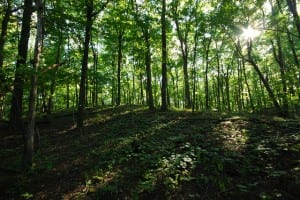Are carbon sinks just another natural resource?
By ucqbsva, on 6 March 2014
Blog by Stijn Van Ewijk, PhD student, UCL ISR
Join in the conversation, follow Stijn on Twitter
The use of natural resources is intricately tied up with climate change. Most notably, the consumption of fossil fuels leads to carbon emissions which in turn cause climate change. Also, carbon sinks like forests regulate the climate by taking up carbon dioxide. Just like fossil fuels, these carbon sinks are increasingly being traded. However, the commodification of carbon sinks may be harmful and counterproductive.
 In carbon markets, emissions in one place can be offset either by reducing emissions elsewhere, for instance by energy-efficiency measures, or by sequestering emissions, for instance through reforestation. Carbon dioxide sequestration through reforestation turns a forest into a commodity like many other natural resources. In practice, there are clear limits to carbon offsets: space is finite and mature forests cannot sequester additional carbon. Also, there are many competing land uses such as agriculture and infrastructure.
In carbon markets, emissions in one place can be offset either by reducing emissions elsewhere, for instance by energy-efficiency measures, or by sequestering emissions, for instance through reforestation. Carbon dioxide sequestration through reforestation turns a forest into a commodity like many other natural resources. In practice, there are clear limits to carbon offsets: space is finite and mature forests cannot sequester additional carbon. Also, there are many competing land uses such as agriculture and infrastructure.
Commodification of carbon sinks typically serves a short-term economic agenda of efficiency maximization. Proponents argue that by allowing carbon and carbon sinks to be traded, both can be produced at locations where the conditions are optimal. For instance Brazil has more potential for cheap carbon sequestration while carbon intensive electricity generation plants are most efficiently located close to high electricity demand in Western Europe.
In addition to the limited global potential for offsets, there are some other disadvantages to the commodification of carbon sinks. Here are three of them.
- Ethically, it can be undesirable to pay someone else to take care of your harmful carbon emissions since poorer nations may be forced into selling offsets at short term profits. On the long term, such nation could benefit more from other land uses.
- Practically, it is hard to measure and regulate carbon offsets. For example, if a forest is about to be cut, does it count as an offset to ultimately not cut it? In some countries, this ambivalence has been exploited by “planning” increased deforestation.
- Economically, in the long run, global carbon offsets may not be beneficial. Easy offsets in developing countries reduce the incentive for innovation in production and energy technology that can bring more efficient abatement in the long run.
Unfortunately, carbon offsets programs are often seen as a legitimate option for climate change mitigation. Influential sustainability indicators like the Ecological Footprint (EF) heavily emphasize carbon uptake by forests and strongly suggest that devoting land to forest is the primary means to managing climate change. Not only nations, also consumers offset their emissions too easily by for instance buying carbon offsets along with their plane tickets.
Currently, the Western world emits most carbon dioxide while having very limited potential for reforestation. With developing countries quickly catching up, especially China, it seems more attractive to seek for long-term solutions that bring down carbon emissions than to legitimate further emissions with reforestation projects. Clearly, carbon sinks should not be treated as just another natural resource.
Photo credit: Joshua Mayer under CC
 Close
Close

